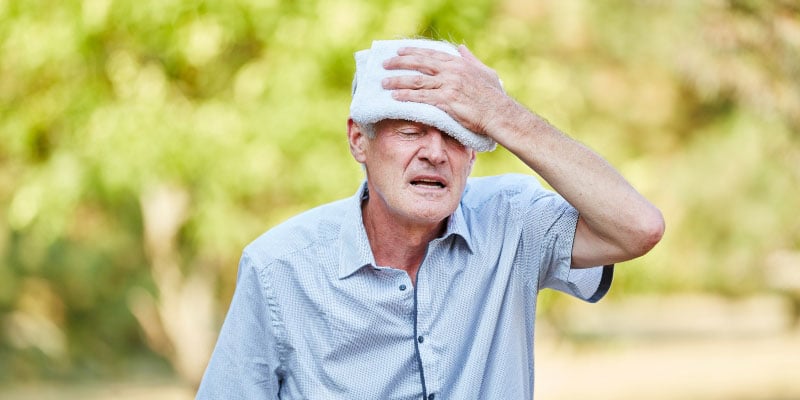There’s no reason you can’t get outdoors and enjoy the summer sun as a senior, but it’s also important that you take some precautions against the heat. Your body struggles to regulate internal temperatures as you age, making seniors one of the groups most likely to be affected by the heat and fall victim to dangerous health conditions like heat stroke.
In order to combat the dangers of overheating, sunburns, heat exhaustion, and heat stroke, you need to be prepared. Here are 9 summer heat tips for seniors to stay safe while enjoying everything the Midwest summer season has to offer.
1. Stay Hydrated!
The simplest tip for maintaining a healthy internal body temperature and avoiding heat illnesses is also the one that is often the first forgotten. Staying hydrated is the best way to avoid heat exhaustion and heat stroke, and it doesn’t take much effort.
A helpful tip is to keep water easily accessible, so you don’t forget to drink it during the day. Keeping reusable water bottles in the fridge or by the door can remind you to grab one before you leave the house to have with you in the summer heat. Staying hydrated is important all year-round, so it’s a great habit to start!
2. Eat the Right Foods!
Heavy meals and hot foods can increase your internal body temperature and actually make you more likely to overheat. Instead, having light, fresh, and energizing foods that increase your energy levels can keep your internal body temperature at a healthy level during the summer. In addition, foods like fruits and vegetables have a high water content and can help you stay hydrated in addition to drinking water.
3. Dress Appropriately!
Don’t wear heavy layers during the summer— even if you are prone to getting cold. Your internal body temperature can quickly rise if you are dressed too warm. Instead, try clothing like:
- Lightweight shirts and pants
- Breathable fabrics
- Light-colored clothing
- Hats
4. Wear Sunscreen!
Avoid sunburn and painful blisters by protecting your skin. Sunscreen should be applied liberally and often during summer days when you are outdoors. Even if the day is overcast, the UV rays of the sun can still give you sunburn. Use an SPF of at least 30, remember to cover areas that are often forgotten like:
- The top of your head
- Ears
- Knees
- Exposed parts of your feet and ankles
- Neck and chest
5. Check the Weather!
Don’t let a heat wave catch you by surprise! Keeping a close eye on the weather predictions and the heat index can help prepare for the day ahead. Be aware of humidity as well— especially in the Midwest. Humidity can make a temperate day feel much hotter, so be ready. The heat index includes humidity in it’s calculation, so it’s a great resource to have on hand.
6. Don’t Overexert Yourself!
Using too much energy can result in your body becoming dehydrated much quicker than usual, which can lead to heat stroke or collapse. Your energy levels also drop as you age, making this dehydration process happen faster. There are plenty of great ways to get outdoors that don’t require you to put too much energy into our activities.
7. Stay Indoors!
An easy way to avoid the heat is to just stay inside. On particularly hot days, plan to stay indoors— whether in your own home or at a place like a shopping center or movie theater. Indoor activities and alternative exercises can help you stay fit and active without having to brave the hot sun and risk your health.
8. Find Air-Conditioned Areas!
There’s never a better time to invest in an air conditioner than when you become a senior. Having a source of cold air can be a major help during heat waves, as it can help you lower your body temperature quickly. If you plan on going outside, having a plan in place to stop at air-conditioned stores or cafes throughout the day can be another way to avoid too much heat exposure.
9. Be on the Lookout for Warning Signs!
Knowing what the signs of heat exhaustion and heat stroke are can be the difference between avoiding sickness or becoming a victim.
The major signs of oncoming heat exhaustion include:
- Excessive sweating
- Dizziness
- Weakness
- Headache
- Tiredness
- Muscle cramps
- Nausea
- Fainting
If you feel any of these signs coming on, immediately cool yourself off with fans, air conditioning, a cold bath, and plenty of cool drinks and water. This will help bring your internal body temperature down and avoid the more serious heat illness, heat stroke. If you feel these signs progressing, get out of the sun immediately and call 911. Heat stroke can lead to seizures and/or a coma if not dealt with.
Avoid these serious symptoms of heat exhaustion and stroke by taking the heat and hot temperatures of summer seriously, especially as a senior. By following these tips and monitoring your internal body temperature, you can enjoy everything summer has to offer in healthy moderation.





